Everyone wants to have the best smile they can possibly have to feel as confident and healthy as possible. For those who want to take care of their teeth the best they can, we have made a checklist of everything you should be practising in order to gain and/or maintain your perfect smile!
Brush your teeth twice a day
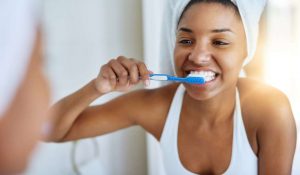 Something you have probably been taught about from a very young age is to brush your teeth at least twice a day. Normally, this will be in the morning and before you go to sleep at night. You should aim to brush your teeth for around 2 minutes in order to make sure they are kept as healthy as possible.
Something you have probably been taught about from a very young age is to brush your teeth at least twice a day. Normally, this will be in the morning and before you go to sleep at night. You should aim to brush your teeth for around 2 minutes in order to make sure they are kept as healthy as possible.
It is preferable that you brush your teeth with a fluoride-based toothpaste. Exposure to fluoride will stop acid on your teeth from penetrating through and causes holes which are known as cavities.
Brushing your teeth stops plaque from building up. Plaque is a film of bacteria which coats your teeth and contributes towards developing a gum disease or general tooth decay.
Use an electric toothbrush
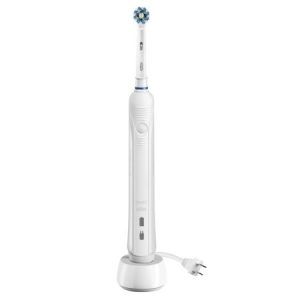 Although using a manual toothbrush does the job, many professionals suggest that for taking the best care of your teeth, you should aim to use an electric toothbrush.
Although using a manual toothbrush does the job, many professionals suggest that for taking the best care of your teeth, you should aim to use an electric toothbrush.
With that being said, it is not always about the toothbrush but about how you use it. There is no point investing in an electric toothbrush if you do not follow other advice on how to best look after your teeth.
You can get electric toothbrushes which come with extra things like an app to compliment your tooth brushing routine. Check out the Oral B Genius 9000. It comes with a downloadable app which links to your toothbrush via Bluetooth and creates reports on your brushing habits and keeps you up to date about things like changing your toothbrush head.
Floss between your teeth
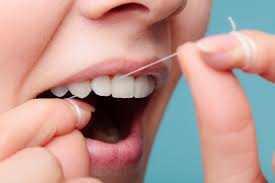 A task many people begrudge, but it is a very important step in maintaining the health of your mouth and teeth.
A task many people begrudge, but it is a very important step in maintaining the health of your mouth and teeth.
Aim to use floss or an interdental brush each day in order to remove food, debris and plaque that may be lodged in between your teeth.
You should not be too aggressive when you floss as you risk harming your gums by doing this and causing bleeding. It is important to note that when you first start flossing, your gums may be tender and you may see bleeding, but this is normal if you have only just started your flossing journey. That being said, if you see regular bleeding after a few days, you will need to see a dentist just to make sure everything is in order and that you are flossing correctly.
To use dental flood, take around 12-18 inches/ 30-45cm of floss and grasp it so you have a few inches of floss taut between each hand. Then you can slip the floss between the teeth as far as it will comfortably go down. Floss with around 8 to 10 stroke in an up and down motion between each tooth to successfully dislodge any plaque.
Using Mouthwash
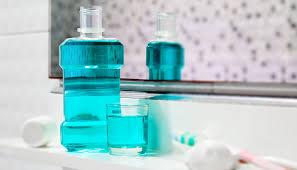 Mouthwash is a great addition to your oral hygiene routine and can be effective for combating bad breath. However, there is a right way to use it so as to not harm your teeth. Mouthwash contains fluoride which, as discussed, can help to prevent tooth decay and cavities. But, you should not use mouthwash straight after you have brushed your teeth, contrary to popular belief. If you use mouth wash straight away after brushing your teeth, it will wash away the concentrated fluoride on your teeth which was left by the toothpaste you used.
Mouthwash is a great addition to your oral hygiene routine and can be effective for combating bad breath. However, there is a right way to use it so as to not harm your teeth. Mouthwash contains fluoride which, as discussed, can help to prevent tooth decay and cavities. But, you should not use mouthwash straight after you have brushed your teeth, contrary to popular belief. If you use mouth wash straight away after brushing your teeth, it will wash away the concentrated fluoride on your teeth which was left by the toothpaste you used.
Opt to use a mouthwash at different points throughout the day rather than alongside your tooth brushing and your flossing. You should also not eat or drink anything for around 30 minutes after using a mouthwash.
Cut down on sugar and other lifestyle habits
 Having a healthy lifestyle in general will be reflected in the quality of your teeth. Consuming lots of sugar and things like smoking and binge drinking can really affect the health and look of your teeth.
Having a healthy lifestyle in general will be reflected in the quality of your teeth. Consuming lots of sugar and things like smoking and binge drinking can really affect the health and look of your teeth.
If you really want a perfect smile, you should aim to cut down on sugar and alcohol and try to give up smoking altogether. These will also further the rest of your bodies health, promoting a healthy lifestyle.
Visit your dentist regularly
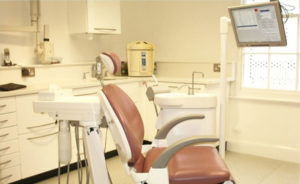 Regular check-ups with your dentist are essential to maintaining the quality of your teeth and gums. Do not put off visiting the dentist because you think there is nothing wrong or actively ignore any issues you may be facing such as bleeding gum, this could be an indicator of gum disease.
Regular check-ups with your dentist are essential to maintaining the quality of your teeth and gums. Do not put off visiting the dentist because you think there is nothing wrong or actively ignore any issues you may be facing such as bleeding gum, this could be an indicator of gum disease.
A check-up allows for your dentist to see if you have dental problems and helps you to keep your mouth as healthy as possible. They may also suggest orthodontic treatment if they believe you could benefit from it.
If problems are not treated in their initial stages, correcting them later down the line may prove a lot more difficult, time-consuming and far more expensive.
It is advised by most dentists that you get a check-up based on your oral health, but you should never go longer than two years without seeing a dentist. Nevertheless, the time between check-ups can vary from three months to two years.
